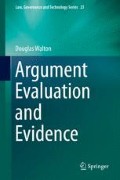Abstract
This chapter confronts the central problem in the current state of argumentation studies, that of clarifying the relationship between argument and evidence. This problem was posed in Chaps. 5 and 6, where the notions of argument and evidence were notably prominent in the use of forensic evidence in the case of the Leonardo Da Vinci portrait and also in the examples of evaluating scientific arguments from correlation to causation. It remains open to be seen how evidence is related to argument generally, as part of the project of argument evaluation. Because this is such a pervasive issue of high generality, it has been reserved for the last chapter. The solution proposed is to fit six argumentation schemes for epistemic defeasible reasoning into a cluster of schemes enabling the basic evidence in a case to generate indirect evidence by using other schemes. This division helps to explain an ambiguity in the use of the term ‘evidence’. Used in a broader sense, ‘evidence’ can include any argument presented to support or attack a claim. In a narrower sense, ‘evidence’ refers to particular kinds of arguments, such as those based on observations, factual findings, statistics, experimental tests or other scientific findings.
Access this chapter
Tax calculation will be finalised at checkout
Purchases are for personal use only
References
Anderson, T., D. Shum, and W. Twining. 2005. Analysis of evidence, 2nd ed. New York: Cambridge University Press.
Berland, L.K., and B.J. Reiser. 2008. Making sense of argumentation and explanation. Science Education 93(1): 26–55.
Cohen, L.J. 1977. The probable and the provable. Oxford: Oxford University Press.
Cohen, L.J. 1979. On the psychology of prediction: Whose is the fallacy? Cognition 7(4): 385–407.
Conee, E., and R. Feldman. 2004. Evidentialism: Essays in epistemology. Oxford: Oxford University Press.
Gordon, T.F., and D. Walton. 2009. Proof burdens and standards. In Argumentation and artificial intelligence, ed. Iyad Rahwan and Guillermo Simari, 239–260. Berlin: Springer.
Gordon, T.F., H. Prakken, and D. Walton. 2007. The Carneades model of argument and burden of proof. Artificial Intelligence 171(10–15): 875–896.
Hahn, U., and M. Oaksford. 2006. Why a normative theory of argument strength and why might one want it to be Bayesian? Informal Logic 26: 1–24.
Johnson, R.H., and J.A. Blair. 1983. Logical self-defense, 2nd ed. Toronto: McGraw-Hill Ryerson.
Loftus, E.F. 1979. Eyewitness testimony. Cambridge, MA: Harvard University Press.
Mochales, R., and M.-F. Moens. 2011. Argumentation mining. Artificial Intelligence and Law 19(1): 1–22.
Pollock, J.L. 1995. Cognitive carpentry. Cambridge, MA: The MIT Press.
Prakken, H. 2004. Analysing reasoning about evidence with formal models of argumentation. Law, Probability & Risk 3(1): 33–50. [PDF].
Prakken, H. 2005. A study of accrual of arguments, with applications to evidential reasoning. In Proceedings of the tenth international conference on artificial intelligence and law, Bologna, 2005. New York: ACM Press, 85–94.
Redford, C., and A. Agah. 2014. Evidentialist foundationalist argumentation for multi-agent sensor fusion. Artificial Intelligence Review (42):211–243. Accessed on 14 July 2014 at this site. doi:10.1007/s10462-012-9333-3.
Schum, D.A. 1994. Evidential foundations of probabilistic reasoning. New York: Wiley.
Stein, A. 2005. Foundations of evidence law, 2005. Oxford: Oxford University Press.
Tillers, P. 1989. Review: Webs of things in the mind: A new science of evidence. Michigan Law Review 87(6): 1225–1258.
Tversky, A., and D. Kahneman. 1982. Judgments of and by representativeness. In Judgment under uncertainty: Heuristics and biases, ed. D. Kahneman, P. Slovic, and A. Tversky. Cambridge: Cambridge University Press.
Vreeswijk, G. 2003. Review of Kevin B. Korb and Anne E. Nicholson, Bayesian Artificial Intelligence, Chapman and Hall, 2003. Artificial Intelligence and Law 11: 289–298.
Walton, D., and E.C.W. Krabbe. 1995. Commitment in dialogue. Albany: State University of New York Press.
Walton, D., and G. Sartor. 2013. Teleological justification of argumentation schemes. Argumentation 27(2): 111–142.
Walton, D., and N. Zhang. 2013. The epistemology of scientific evidence. Artificial Intelligence and Law 21(2): 173–219.
Walton, D., C. Reed, and F. Macagno. 2008. Argumentation schemes. Cambridge: Cambridge University Press.
Wigmore, J.H. 1931. The principles of judicial proof. Boston: Little, Brown and Company.
Author information
Authors and Affiliations
Rights and permissions
Copyright information
© 2016 Springer International Publishing Switzerland
About this chapter
Cite this chapter
Walton, D. (2016). Evidence and Argument Evaluation. In: Argument Evaluation and Evidence. Law, Governance and Technology Series, vol 23. Springer, Cham. https://doi.org/10.1007/978-3-319-19626-8_8
Download citation
DOI: https://doi.org/10.1007/978-3-319-19626-8_8
Publisher Name: Springer, Cham
Print ISBN: 978-3-319-19625-1
Online ISBN: 978-3-319-19626-8
eBook Packages: Religion and PhilosophyPhilosophy and Religion (R0)

